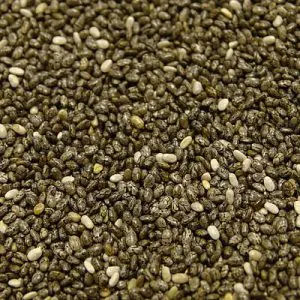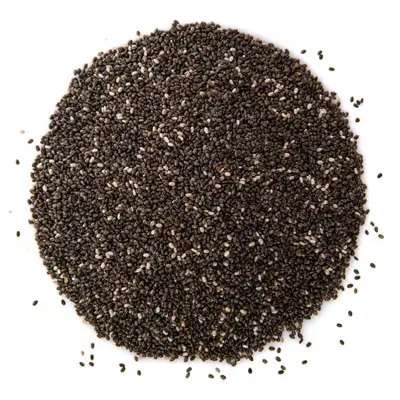The first records of Chia (Salvia hispanica) date back to 3500 B.C. when it was a main staple of in the Aztec diet. It also had religious significance and was used in certain ceremonies. We find evidence much later, in 1500 B.C., that it was grown in Mexico by the Toltec people. Chia was ground into flour, mixed into drinks, pressed for its oil and used in preparation of medicines. Easily transported chia flour served as an excellent energy source during long travels. In Mayan, the word ‘chia’ means strength, and it was believed to have supernatural powers, with warriors attributing increase in stamina to the seed.
Due to chia’s religious significance, it was banned by the Spanish when they conquered the region in the 1500’s. As a result, the use of chia (or any records of it) seems to have dropped out. Chia did manage to survive however in the more remote regions of Mexico, but was not the widespread staple it had once been. It wasn’t until the 1990’s when collaboration between American and South American scientists resulted in the beginning of commercial production primarily in Argentina. Chia is now grown in Argentina, Mexico, Peru, Bolivia and Australia.
Today, chia is a main fuel for the ‘running people’ of the Tarahumara tribe in Mexico who are considered super athletes, running for 50 or even 100 miles for the pure enjoyment of it. They concoct a drink called iskiate made of chia seeds, which has been described as “10,000 year old Red Bull”.

One of Chia’s most interesting properties is its ability to form a gel when allowed to soak in water for about 30 minutes. It has been suggested that this also occurs in the stomach, which would slow the breakdown of carbohydrates, resulting in the sustained energy boost so admired by the ancient Aztecs and Mayans!
Chia seeds are very rich in omega-3 fatty acids. Their high content of antioxidants is what makes them so immune to deterioration. They provide fiber, calcium, phosphorus, magnesium, manganese, copper, iron, molyndenum, niacin and zinc. And best of all, they don’t have to be ground or heated in order to make these nutrients available to the body. They can be added to snack mixes like granola or trail mixes to be enjoyed while out on any trekking or camping adventure, or for a quick afternoon pick-me-up at the office!
Studies suggest that Chia could contribute to healthy weight loss, due to its high protein content. 100 g of chia provides 40 g of dietary fiber, which is the equivalent of 100% of the daily recommendation for adults. This fiber content is higher than quinoa, flaxseed and amaranth, as well as almonds and peanuts. Chia is also rich in iron, possessing 6 times more iron per 100 grams of edible portion than spinach! Salmon has long been a resource for omega 3, but in recent years we’ve become increasingly worried about heavy metals. Chia is a perfect alternative, containing 8 times more omega 3 than salmon, and completely free of such concerns about mercury.
More Information
Sources:
History of Chia, Unison International Company
http://www.chiaseeds.net.au/pages.php?pageid=10
The Tarahumara Diet is Tough to Swallow, Runner’s World, 9-15-2010
https://www.runnersworld.com/other-voices/the-tarahumara-diet-is-tough-to-swallow
Chia Seed History and Origin, Ancient Grains
http://www.ancientgrains.com/chia-seed-history-and-origin/
Chia Seeds: Tiny Seeds with a Rich History, Food & Nutrition, 12-28-2013
https://foodandnutrition.org/january-february-2014/chia-seeds-tiny-seeds-rich-history/
What is Chia?, Dr. Andrew Weil, 5-15-2006
https://www.drweil.com/diet-nutrition/nutrition/what-is-chia/
The Promising Future of Chia, Salvia hispanica L.
https://www.ncbi.nlm.nih.gov/pmc/articles/PMC3518271/
Nutritional and therapeutic perspectives of Chia (Salvia hispanica L.): a review
Videos:
YouTube:
Dr. Eric Berg, “Amazing Chia Seeds”
https://www.youtube.com/watch?v=Jx2oj1OBnJs
Dr. Josh Axe, “Benefits of Chia Seeds”


